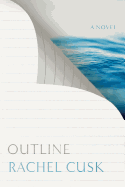
British writer Rachel Cusk's Outline is a brilliant marriage of her fiction (Saving Agnes) and her memoirs (fearless if highly self-absorbed accounts of motherhood and divorce).
Outline's narrator is all but nameless; only near the end does she let her name slip. She's a divorced British writer headed to Greece to teach creative writing. The wealthy, much-divorced Greek man in the next seat tells her about his life during their flight and, later, on his yacht; his stories double back, correcting themselves, reflecting the normal inconsistencies of memory and of self-presentation. Others around her--friends, new acquaintances, writing students--offer accounts of their own pivotal moments and the resulting novel consists largely of anecdotes that don't center on the narrator.
Outline touches on familiar questions of narrative reliability but goes much further. "I was beginning... to see in other peoples' lives a commentary on my own," she says. Her reactions to what she hears are cerebral, provided without commentary; she herself remains invisible, and yet the outline of a life slowly takes shape. Other characters' experiences of marriage, parenthood, self-expression and identity take the stage, but they suggest the life of a woman profoundly engaged with similar preoccupations.
A novel so thoroughly reliant on information told by secondary characters with little response from the narrator is unusual, but Outline is an ingenious and highly successful marriage of form and content. It is also a reminder that we may see the lives of those around us as disconnected episodes that might make good stories, but behind those events are lives as deeply lived as our own. --Jeanette Zwart, freelance writer and reviewer

